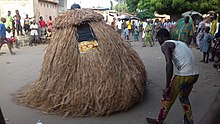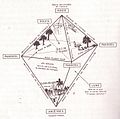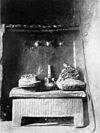Portal:Traditional African religions
Introduction The beliefs and practices of African people are highly diverse, including various ethnic religions. Generally, these traditions are oral rather than scriptural and are passed down from one generation to another through folk tales, songs, and festivals, and include beliefs in spirits and higher and lower gods, sometimes including a supreme being, as well as the veneration of the dead, and use of magic and traditional African medicine. Most religions can be described as animistic with various polytheistic and pantheistic aspects. The role of humanity is generally seen as one of harmonizing nature with the supernatural. In the past, African religion used to be referred to as 'traditional' but this is no longer appropriate. 'Traditional' was used to distinguish African religion from Abrahamic religion which had been in Ethiopia centuries before European colonialism came to the continent as a result of proselytism. Colonialism supported the false view that Africa had no religion. (Full article...) Selected articleÒrìṣà (original spelling in the Yoruba language), known as orichá or orixá in Latin America, are the human form of the spirits (Irunmọlẹ) sent by Olodumare, Olorun, Olofi in Yoruba traditional identity. The Irunmọlẹ are meant to guide creation and particularly humanity on how to live and succeed on Earth (Ayé). Most Òrìṣà are said to be deities previously existing in the spirit world (Òrun) as Irunmọlẹ, while others are said to be humans who are recognized as deities upon their deaths due to extraordinary feats. Many Òrìṣà have found their way to most of the New World as a result of the Atlantic slave trade and are now expressed in practices as varied as Santería, Candomblé, Trinidad Orisha, Umbanda, and Oyotunji, among others. The concept of orisha is similar to those of deities in the traditional religions of the Bini people of Edo State in southern Nigeria, the Ewe people of Benin, Ghana, and Togo, and the Fon people of Benin. Selected imagesFestivalsThere are several religious festivals found in the various Traditional African religions. Some of these are listed below next to their corresponding religion :
Selected biographyMaad Semou Njekeh Joof (or Maad Semou Djiké Diouf) was a member of the Joof Dynasty of the Kingdom of Sine now part of independent Senegal. Maad means king and Maad a Sinig means king of Sine in Serer. He was the founder of the Royal House of Semou Njekeh Joof, founded in the early eighteenth century. His royal house was the third and last royal house founded by the Joof family of Sine and Saloum. Since its foundation, at least seven kings of Sine from his royal house had succeeded to the throne including his son Maad a Sinig Boukar Tjilas Sanghaie Joof. In the Serer religion, Semou Njekeh Joof is immortalized in the cult of Tagdiam. The principle shrine of Tagdiam is named after him. Tagdiam in present-day Senegal was where he lived. Selected quote
On the influence of African religion on art, Aloysius M. Lugira (2009), quoting Ladislas Segy (1975), Source: African Traditional Religion, Third Edition, 2009 by Aloysius M. Lugira, quoting Ladislas Segy, "African Sculpture Speak",Da Capo Press (1975), p. 118, ISBN 9780306800184
Did you know
Related portalsTopicsFor more Traditional African religion topics, see Category:Traditional African religions.
CategoriesWikiProjectsThings you can doAssociated WikimediaThe following Wikimedia Foundation sister projects provide more on this subject:
Discover Wikipedia using portals |





































